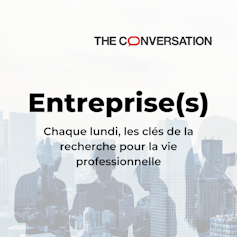What skills are expected of future managers?
Predicting what makes a good manager of the future is difficult, if not impossible. However, it is essential to train them today. An original approach has been implemented at the University of Montpellier.
Marion Polge, University of Montpellier; Françoise Pierrot, University of Montpellier; Sarah Mussol, University of Montpellier; Sophie Casanova, University of Montpellier and Sylvie Sammut, University of Montpellier

"We cannot say which manager will be the young person we are recruiting today. They are neither in the top-down vertical structure nor in the horizontal structure of a cross-functional company. They are in the diagonal... and the slope of that diagonal remains to be invented." Françoise, an experienced SME manager, has noticed the shift underway among younger generations, who are seeking new forms of relationships: as employees, workers, and managers.
Not exactly in opposition, but still in disagreement, the new generation of recruits aspires to different decision-making and relational systems. Which managers will drive change, and what skills will they be able to draw on, caught between digitalization, AI, professional nomadism, hedonism, the need to belong, and disengagement? To reflect on the issues related to this question, the teams at Montpellier Management—the university's management school—have created a THINK Lab, a kind of ideas laboratory where executives, managers, alumni, and Professors meet Professors exchange views and imagine together who will be the manager of tomorrow. What salient ideas emerge from these exchanges?
The ambiguous demand for meaning at work
First observation: the relationship to work is changing, influenced by the aspirations of younger generations but also by broader societal change. As Christophe, a certified public accountant, notes, "It's a general change in the relationship to work, among young people too, perhaps more so, but it's everyone. " Digital transformation is disrupting our cognitive patterns and our relationship with knowledge and time, while the demands of environmental transition may lead us to refocus on personal or collective aspirations outside the workplace.
While the quest for meaning fuels discussions, it is not universally accepted. Everyone agrees on its importance, but for some detractors, it is not a new topic. Others consider it secondary at a time when employees and managers are more focused on hedonistic behaviors. The exaggeration of individual desires even creates a paradox with the quest for meaning for the company, which would require collective commitment.
In short, the quest for meaning at work is a complex issue, combining personal fulfillment, societal impact, and professional development. Organizations must adapt to these changes in order to create an environment conducive to the fulfillment and contribution of each individual. They are therefore adopting models based on collective intelligence, where managers and employees seek to align their actions on the basis of shared values. Personal expectations, well-being at work, and the need for personal fulfillment are prompting some people to reevaluate their career paths, questioning the way in which skills are acquired and developed.

Whether you are a manager looking for strategies or an employee wondering about the choices made by your superiors, sign up for our "Business" newsletter: the keys to research for your professional life and advice from our experts.
Subscribe today
What skills?
In addition to hard skills (expertise) and soft skills (behavioral skills), there are now mid skills (intermediate skills) and mad skills. The latter now occupy a very special place because, unlike "hard skills, " which are acquired through training and experience, "mad skills" essentially relate to an individual's ability to elevate a group or stand out from the anonymous crowd. Hence the incongruous combination of the terms "skill" and "mad." Heterodoxy as a benchmark in terms of creativity, hypersensitivity, trajectory, etc.
The portfolio of required skills has therefore become much more complex, combining objective and individual parameters with emotional and collective elements derived from personal experience, as well as resilience and boldness. "To soften the shock of joining a company, we also talk about humility," emphasizes Jean-Marie, an entrepreneur. Everyone feels integrated into a collective where they feel useful and legitimate, especially since the company allows them to broaden their range of knowledge. We are moving away from conformism to find "the" talent that will be able to shake up the collective and strengthen the "working together" spirit. In an increasingly competitive world, the entity's ability to adapt and magnify everyone's skills highlights its uniqueness and, by extension, its attractiveness.
Expectations of everyone, but especially of each individual
Faced with these various developments, the expectations of new employees, managers, and the company are changing. Coordinating these expectations seems to be a prerequisite for harmonious functioning within the organization.
"My relationship with work means that I perform a role in order to flourish, to learn, and to live in a pleasant environment. This change in my relationship with work has also changed my sense of belonging," explains Maxence, a former Moma student.
New employees aspire to inclusive work environments where they feel valued and supported. They expect clear career development opportunities, adequate training from the moment they join the company, and a corporate culture that encourages continuous learning and responsibility.
The high demands placed on companies, combined with the individual desires of employees, create a paradoxical tension that can undermine the sense of belonging. The pressure, real or perceived, to achieve high organizational goals while pursuing personal ambitions can potentially lead to a loss of motivation and loyalty to the company. As a result, employees adopt nomadic behaviors, showing a tendency to change employers as opportunities arise.
Declining loyalty to the company
Managers may feel confused by these new demands: environmental uncertainty is compounded by increasing talent mobility due to paradoxical individual expectations. This creates a need for rapid upskilling within the company, particularly in social skills that foster loyalty: communication, adaptability, collaboration, conflict management, inclusive leadership, mentoring, and strategic vision. To facilitate this work, managers also expect their future employees to have a greater ability to integrate and understand the expectations of different stakeholders.
"The accumulation of know-how and skills thanks to employees is the basis of the uniqueness, even rarity, of the company's offering and therefore its value," writes Denis Dauchy. The question of whether the skills expected by companies match those of their employees is essential to smooth operation. The collective work carried out within the THINK lab has highlighted the aspirations of the younger generations (and others), which are reflected in new needs and a new perspective on the company. The challenge facing managers and entrepreneurs lies in the need to take these societal changes into account, supporting employees in enriching their skills while respecting their personal aspirations and ensuring performance objectives are met. The ability of individuals to adapt, but also to adapt to each other, is key to what appears at first glance to be a paradox.
Marion Polge, Associate Professor in Management Sciences, University of Montpellier; Françoise Pierrot, Doctor of Management Sciences, University of Montpellier; Sarah Mussol, Associate Professor in Management Sciences, University of Montpellier; Sophie Casanova, Senior Lecturer in Entrepreneurship, University of Montpellier and Sylvie Sammut, University Professor in Entrepreneurship and Strategic Management, University of Montpellier
This article is republished from The Conversation under a Creative Commons license. Readthe original article.